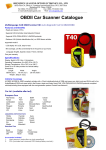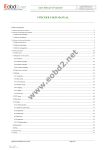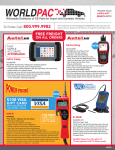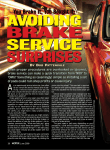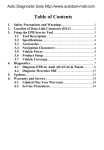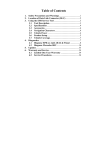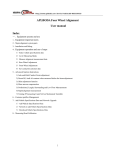Download Servicing Brakes Today
Transcript
Bosch Servicing Brakes Today Servicing Brakes Today Are you the type who consults the service manual only when you get stuck? Or Do you take the time to review repair procedures in advance? Servicing Brakes Today You might remember seasoned technicians complaining about the transition from front drum brakes to front disc brakes, or about the addition of rear disc brake systems. Servicing Brakes Today Brake system service is one repair area often taken for granted. Most of us wouldn’t hesitate to rack a vehicle, pull the wheels and begin performing a brake inspection or repair without any additional guidance. Servicing Brakes Today In the early days, you could repair virtually any brake system with four or five basic tools. 7317A 6516 Servicing Brakes Today Did you make comments or complaints when you had to purchase a tool to depress the rear disc brake caliper piston, by rotating the piston into the caliper? 4589 This new tool was required for vehicles with parking brake systems that mechanically adjusted the rear disc brake caliper piston Servicing Brakes Today Vehicle braking systems have changed over the years, but they remained very simple for the most part and up until 10 years ago, still required very basic tools. Servicing Brakes Today The addition of antilock braking systems (ABS) became a very big concern in the mid 80’s, and many of us attended training sessions to learn how to handle potential problems. This was a big leap for many technicians, because now electronics were involved in mechanical systems Servicing Brakes Today The basic brake system now included ABS control modules, wheel speed sensors and electrically operated hydraulic actuators. Servicing Brakes Today Technicians who never needed or wanted to use a scan tool now needed one for some basic services. The scan tool is now an essential part of brake service. Scenario This 08 VW is equipped with an electric parking brake. Imagine you’re servicing this vehicle for the first time. Would you begin the service right away, relying on experience, or would you consult a service manual first? What you decide to do will make the difference between a good repair and a big mistake Scenario In this example, you decide to jump into the service without instruction from the service manual. Scenario The caliper is easy to remove—basically, remove two bolts and the caliper slides off. Scenario The brake pads are a straightforward removal process, too. Scenario You inspect the caliper and determine it’s reusable Scenario The next step for most technicians would be to depress the caliper piston, so you pull out your trusty brake caliper piston depressor and begin applying pressure to the piston. The piston moves a little, then stops What now? Well, you think maybe the piston is stuck or cocked a little. So you apply more pressure. Scenario This is when the swearing begins. What just happened? Scenario You just damaged the parking brake motor assembly. This might cost you as much as $800 for one caliper Is this where you finally consult the service manual for the proper procedure for servicing this system? Scenario The proper procedure involves using a scan tool or electronic device to retract the motor. Scenario Once the motor is retracted, you can then depress the caliper piston in the conventional manner. Once the brake service is completed A scan tool is used to properly adjust the parking brake motor. Servicing Brakes Today Many late model cars now uses an electronic parking brake system. The rear disc brake caliper (left) has an electronic motor attached to apply pressure to the brake pads. The motor must be retracted using a scan tool before the caliper piston is depressed. The system is activated by a switch (right) mounted in the console. Lets take a closer look at the systems Servicing Brakes Today An electronic parking brake eliminates the bulky parking brake lever or pedal inside the car. An electric parking brake only needs a small switch or button that can be anywhere and activated by fingertip . Servicing Brakes Today The electronic parking brake application includes some of the most popular vehicle brands: 2000 and up Audi A4, A6, & A8 2002 and up BMW 5 and 7 series and Z4 models 2001 and up Mercedes models with Sensotronic Brake Control Jaguar S‐Type, XF and XJ 2003 and up Volkswagen Passat 2010 Subaru Legacy and Outback Domestic applications include: 2003 to 2006 Lincoln LS 2011 and up Mustang 2008 and up Buick Lacrosse, Regal and Cadillac CTS. And many more! Servicing Brakes Today There are two common types of automatic parking brake. A drive unit that activates the cable Type 1 An electric motor on each of the two rear-axle brake calipers. Type 2 Controls Both systems use a separate Electronic Control Unit (ECU) or the ECU function is incorporated into the ABS system. Whether the controller is separate or incorporated into the ABS system, the ECU electronics will contain a bidirectional motor controller circuit connected to the brake actuator motor. Manual apply input will come from the parking brake switch that is directly connected to the controller or ABS. Type 1 A drive unit that activates the cable Electro-Mechanical Parking Brake (EPB), Type 1 Electro-Mechanical Parking Brake (EPB), The actuator is made up of a gear train that rotates a splined screw nut to retract the two cables. Type 1 Type 1 is an electric motor and mechanical actuator mechanism mounted to the body of the vehicle. Type 1 Tension can be fully released from the park brake cables to allow for service of the park brake system. The tension in the cable can be released with a scan tool. 2011 Buick LaCrosse Type 1 The Buick LaCrosse has an electric parking brake control module that is mounted in the left rear wheel well. The unit has an electric motor, apply actuator, release actuator and temperature sensor. The electric parking brake control module also contains the electronic controls for applying and releasing the parking brake when commanded by the electric parking brake switch. Type 1 2011 Buick Lacrosse Type 1 In the event you need to release the EPB and the battery is dead, the following procedure may be used to release the brakes: 1. Remove the left rear tire and wheel assembly. 2. Remove the left rear wheelhouse panel liner. 3. Remove the protective plug (1) from the EPB manual release. 4. Using an appropriate square-drive tool, rotate the mechanism clockwise until the tension is fully released from the parking brake cables. Up to 50 turns may be required until the parking brake cable tension is fully released. Type 1 2009 Lexus LS 460 Single motor/cable system Type 1 Lexus Single motor/cable system Type 1 Mercedes Benz The manual release for the electric parking brake is located behind the fuel filler flap beside the tank cap. The release tool and a wheel chock can be found in the vehicle tool kit. The protective cap for the release cable is beside the gas cap. Type 1 There are many late model vehicles (2004 and newer) that are using this type of Electric Parking Brake System! Don’t assume it does or doesn't. LOOK! Type 2 An Electric motor on each of the two rear-axle brake calipers that applies the brake. This system has been in our industry for about 10 years Type 2 Audi A8 Parking Brake Type 2 Connect a battery charger as per repair manual OTC-700A Make sure you know the service procedure before you begin! VW and Audi require a battery charger to be connected prior to replacing brake pads Type 2 Connect a battery charger as per repair manual Attaching the charger directly to the positive and negative terminals of the battery may Not be correct. Type 2 Set and Release the Parking Brake Type 2 Select Parking Brake (53) Type 2 You will now hear the calipers being retracted Wait 30 sec. before backing out of the test or you could damage the EPB Module Type 2 Turn the Ignition off Type 2 Now that the Parking Brake has been retracted the pistons, push in just like the front caliper piston Now that you have replaced the Brake pads Lets finish the job Activate Rear brakes from parking brake switch and then check for codes Type 2 When the brake pads become worn out you may have the service indicator light on as well as fault code 02596 (rear brake pads worn) Type 2 Check/Change Adaptation Channel 006 (Pad Thickness) after changing the pads Type 2 Type 2 Round to closest mm. Type 2 There is an easier way to get the Brake Pad thickness! 6596 Brake Pad Gauge Type 2 6596 Brake Pad Gauge Attain measurement without removing any parts from the vehicle Type 2 Adaptation to set pad thickness value Group 06 and change value Type 2 We Have learned! Basic Brake service may not be so basic anymore EPB have been in the industry the since early 2000’s US made vehicle started using EPB as early as 2008 There are 2 types of EPB systems commonly used It is imperative more than ever to have great service information available Having a top tear (High End) scan-tool is important Servicing Brakes Today Thank You


























































